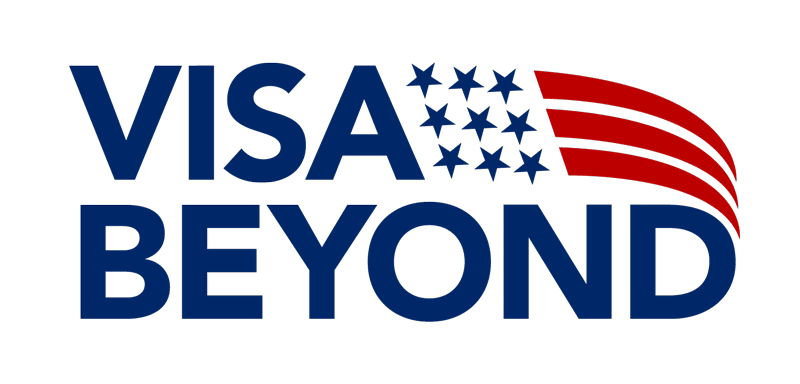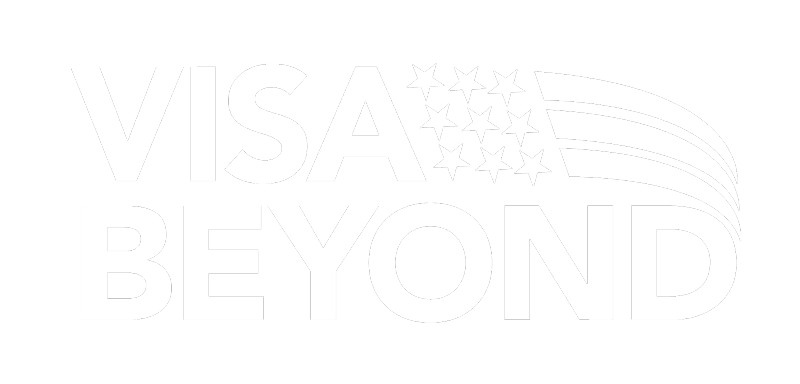J1 Visa Guide:
A Comprehensive
Overview.
J1 Visa allows individuals to participate in U.S.-sponsored exchange programs, such as internships and research, for cultural and professional development.
J1 Visa offers significant benefits, including opportunities for cultural exchange, professional training, and networking, along with options for dependents to accompany the visa holder and study or work under specific conditions.
Cultural Exchange
Experience U.S. culture while
gaining professional skills.
Diverse Program Options
Wide range of categories
for various career.
Family Inclusion
Bring dependents, who can
study and work in the U.S.
Career Growth
Enhance global career prospects
with U.S. experience.
Pathway to Employment
Potential to transition to long-term
residency in the U.S.
Client
Satisfaction
Years
in the business
J1 Visa Overview
and Key Benefits
J1 Visa is a non-immigrant visa that facilitates cultural and educational exchange in the United States. Sponsored by the U.S. Department of State, this visa is intended to promote mutual understanding between people of different countries by allowing foreign individuals to participate in work and study-based exchange programs.
What is the J1 Visa? Eligibility and Key Benefits Explained
This visa is a U.S. exchange visitor program that allows individuals from around the world to live, work, and learn in the U.S. for a limited time. This visa is available to participants of exchange programs in fields such as education, medicine, business, and research.
Eligibility for J1 Visa:
- Must be accepted into a U.S. Department of State-approved exchange program.
- Need to prove sufficient financial resources to cover the stay.
- Must demonstrate non-immigrant intent—meaning applicants intend to return to their home country after completing their program.
Key Benefits of the J1 Visa:
- Provides access to diverse exchange programs like internships, training, and research opportunities in the U.S.
- Offers temporary work and study opportunities, allowing participants to gain hands-on experience in their fields.
- J1 Visa holders can bring family members (spouse and children) through the J2 Visa.
- Enhances participants' professional networks and exposure to U.S. culture and business environments.
J1 Visa Success Rate.
The success rate for the J1 Visa largely depends on factors such as having the correct documentation, proving non-immigrant intent, and being part of a legitimate, government-approved exchange program.
00%
Depending on the
applicant’s field
J1 Visa Application Costs and Processing Timeline
An overview of fees and processing times for applying to the EB3 Visa program, designed for skilled workers, professionals, and unskilled workers.
Application Fees
- SEVIS Fee: $220
- Form DS-160 Fee: $185
Application Timeline
- Standard Processing Time: 4 to 8 weeks
- Program Sponsor Review: The timeline may vary based on the sponsor
FAQs
About J1 Visa.
How long can you stay on a J1 Visa?
The J1 Visa duration depends on the program, typically ranging from 6 months to 7 years. Afterward, you have a 30-day grace period to depart the U.S.
Can you extend your J1 Visa?
Yes, extensions are possible but require sponsor approval and financial proof. The sponsor will issue a new DS-2019 form if approved.
Can J1 Visa holders work in the U.S.?
J1 Visa holders can work, but the employment must be related to their exchange program. Unauthorized work can lead to visa revocation.
Can J1 Visa holders bring family?
Yes, spouses and unmarried children under 21 can join J1 holders on a J2 Visa. J2 holders can study and apply for work authorization.
Can I transition from a J1 Visa to an H1B Visa or Green Card?
Yes, but transitioning to an H1B or Green Card requires employer sponsorship. Some J1 holders may need to meet the two-year home residency requirement first.
What is the two-year home residency requirement?
Some J1 Visa holders must return to their home country for two years after completing the program. A waiver may be possible in certain cases.
How can I avoid J1 Visa denial?
To avoid denial, ensure all documents are complete, show proof of financial support, and demonstrate ties to your home country to confirm your intent to return.
Clients we
work for.
















Visa Programs for Different Categories
J1 Visa supports various categories of exchange programs, each with a specific focus:
- Interns and Trainees: For college students and recent graduates to gain practical work experience in U.S. companies.
- Professors and Research Scholars: Opportunities to teach, research, or participate in educational programs in the U.S.
- Au Pairs and Camp Counselors: Cultural exchange through childcare and camp work.
- Medical Professionals: For doctors and medical students pursuing residency or fellowship programs in the U.S.
- Summer Work Travel: For students to work and travel in the U.S. during their summer break.
Other Exchange Visas
- J1 vs F1 Visa: The Exchange Visitor Visafocuses on exchange and training programs, while the F1 Visa is for full-time academic studies.
- J1 vs H1B Visa: The Exchange Visitor Visa is temporary for educational and training purposes, whereas the H1B is a work visa for specialized employment.
- J1 vs TN Visa: The the Exchange Visitor Visa is for cultural exchange, while the TN visa is for professionals from Canada or Mexico working under the USMCA agreement.
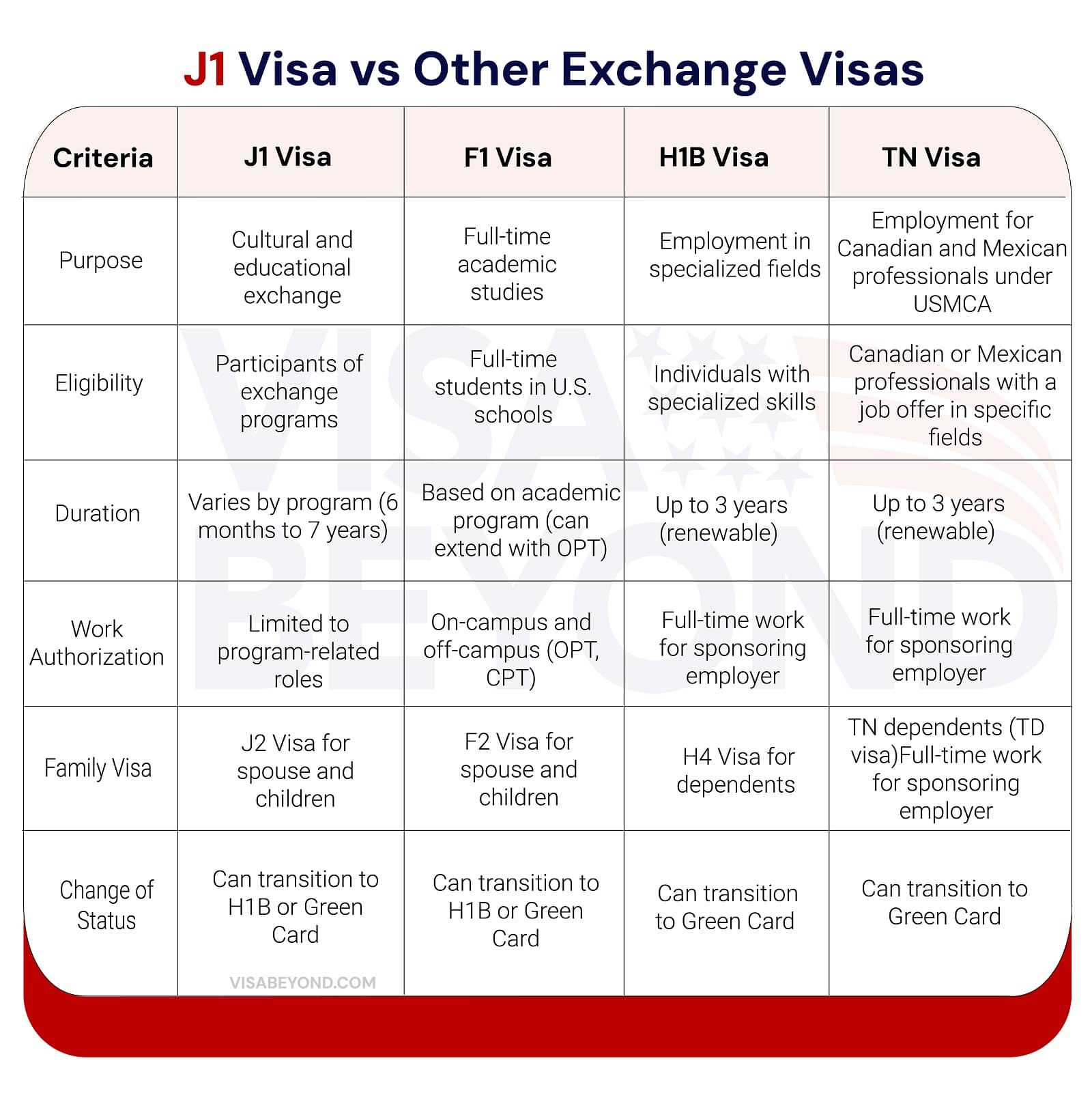
J1 Visa Eligibility and Requirements
To apply for a this Visa, participants must meet specific eligibility and documentation requirements. The visa is available to individuals participating in a wide range of U.S.-approved exchange programs, including internships, teaching, and research.
Who is Eligible for the J1 Visa?
To qualify for this Visa, applicants must:
- Be accepted into a U.S.-approved exchange program administered by a designated sponsor.
- Demonstrate financial capability to cover living expenses during their stay.
- Show intent to return to their home country after completing the program.
J1 Visa Sponsors: Do You Need One?
Yes, all visa applicants must have a designated sponsor. Sponsors are responsible for ensuring compliance with the visa program’s guidelines and issuing Form DS-2019, which is necessary for the J1 visa application.
J1 Visa Requirements for Employers and Host Organizations
Employers or host organizations must meet specific criteria to support a visa participant:
- They must be part of an approved exchange program.
- They are required to provide proper training, housing, or compensation based on the program’s guidelines.
- They must comply with U.S. immigration and labor laws to ensure fair treatment of J1 visa holders.
Proof of English Proficiency for J1 Visa
Applicants must demonstrate English proficiency to ensure they can participate fully in the exchange program. This can be done through standardized tests like TOEFL or IELTS, or by obtaining a certificate of English proficiency from the sponsoring organization.
Exchange Visitor Visa Categories and Program Types
This visa offers multiple categories for various exchange programs, each tailored to specific educational, professional, and cultural goals.
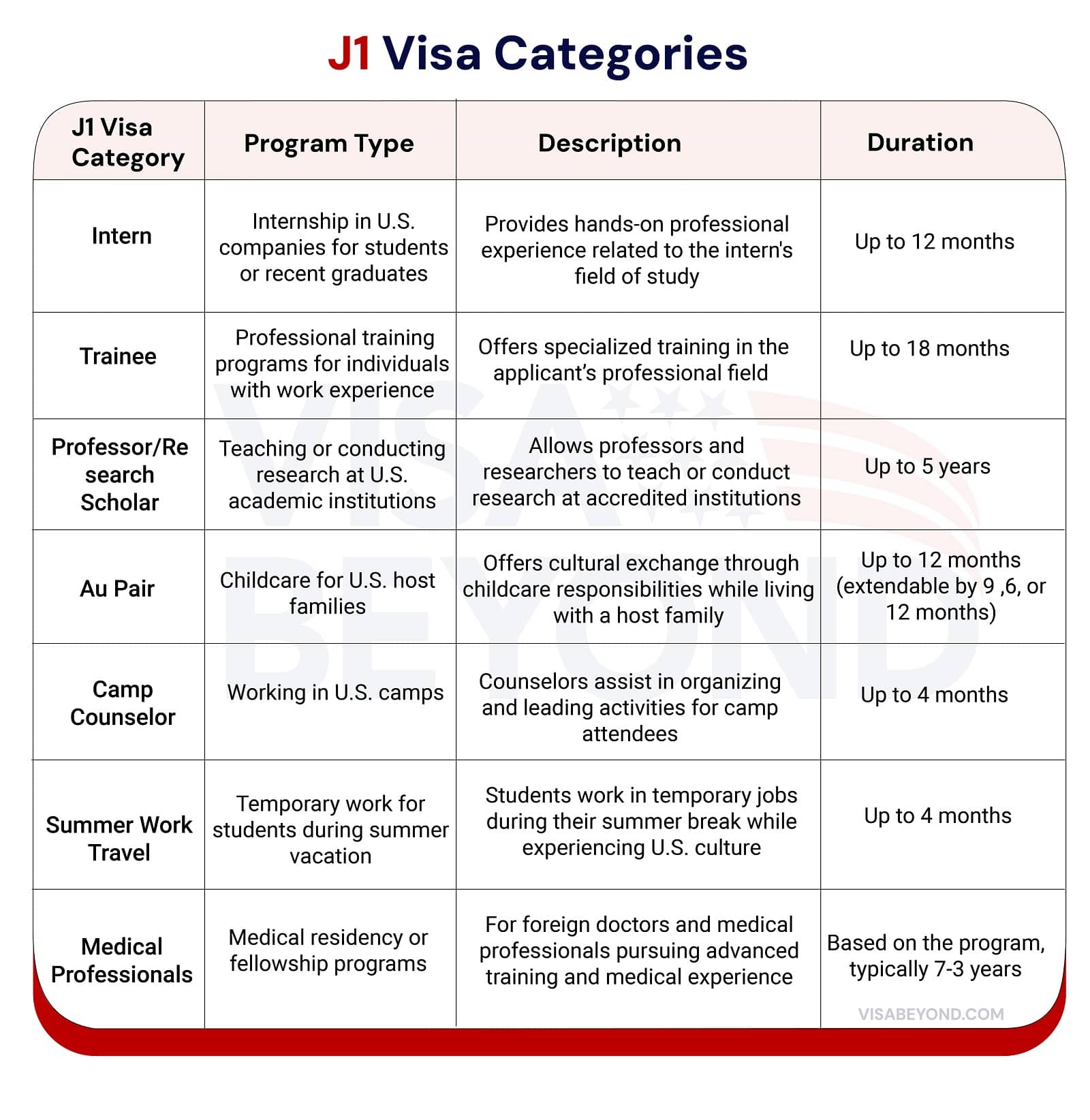
J1 Visa for Interns and Trainees: What's the Difference?
- Interns: Designed for current students or recent graduates (within 12 months) to gain practical experience in their field of study through internships in U.S.-based organizations.
- Trainees: For professionals with at least one year of experience to receive specialized training in their industry.
J1 Visa for Teachers, Professors, and Scholars
This visa category allows international educators to teach, research, or lecture in the U.S. Participants can work at primary or secondary schools, universities, or academic institutions as part of cultural and educational exchange.
J1 Visa for Au Pairs, Camp Counselors, and Summer Work Travel
- Au Pairs: Live with a host family, provide childcare, and experience U.S. culture.
- Camp Counselors: Work in summer camps across the U.S., leading activities and assisting campers.
- Summer Work Travel: College students can work in the U.S. during their summer break, combining employment with travel.
Medical Professionals and J1 Visa: Residency and Fellowship Programs
This visa also accommodates foreign medical professionals. It allows them to participate in residency and fellowship programs in U.S. hospitals, where they can gain advanced training and experience while being sponsored by a U.S. medical institution.
Visa Application Process: Step-by-Step Guide
J1 Visa application process involves several key steps, from finding a designated sponsor to attending your visa interview. It’s essential to follow each step closely to ensure your application is processed without issues.
How to Apply for a J1 Visa
Employers play a crucial role in the visa application process. They must submit a petition on behalf of the applicant, demonstrating that the role being offered requires someone with extraordinary ability. Employers need to provide a job offer, a detailed job description, and evidence that the applicant meets the O-1 visa criteria.
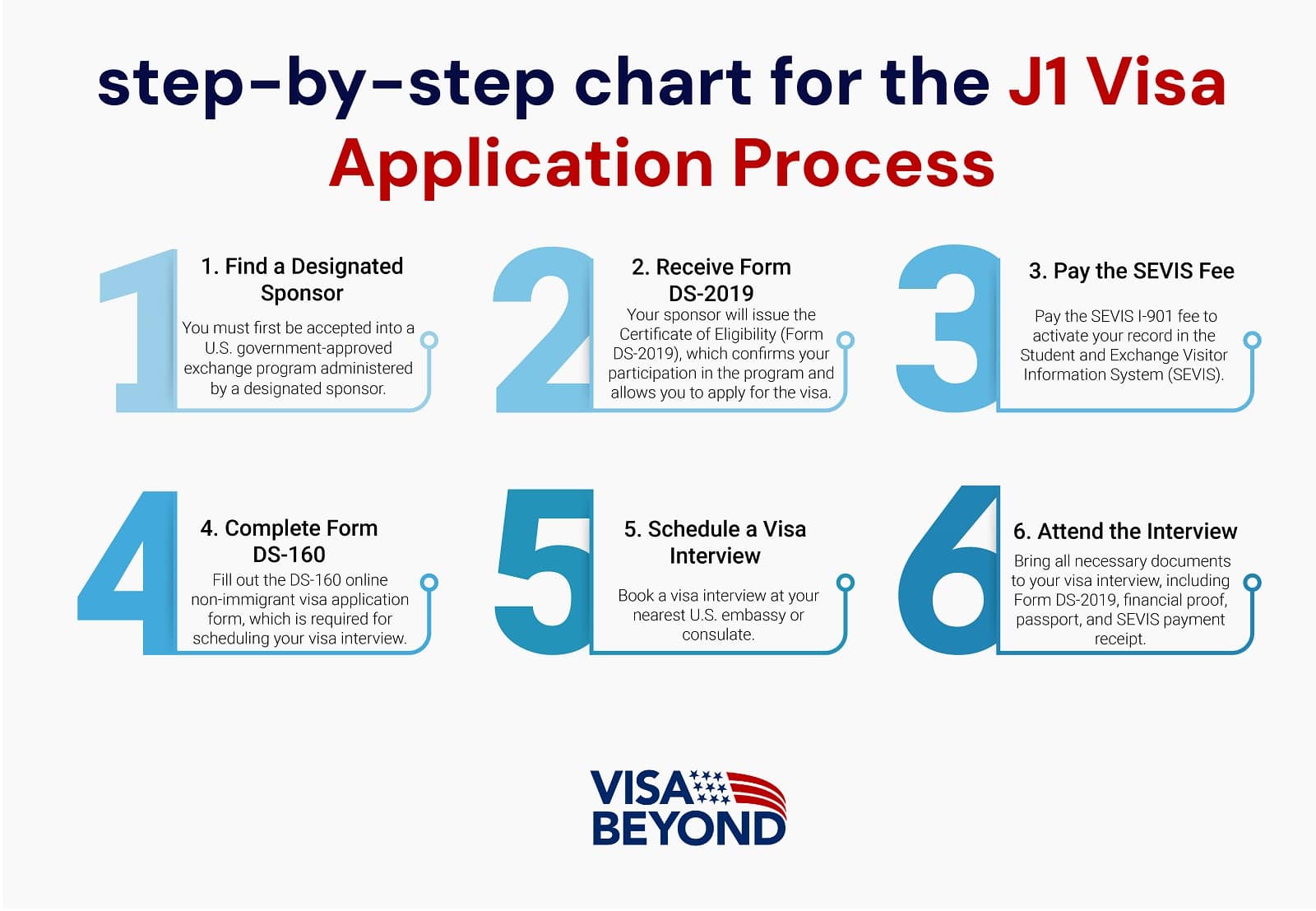
J1 Visa Application Documents Checklist
- Form DS-2019 (Certificate of Eligibility) from your sponsor
- Form DS-160 (Non-immigrant Visa Application) confirmation page
- Passport (valid for at least six months beyond your intended stay)
- SEVIS fee payment receipt
- Financial support documents (bank statements or sponsor letters)
- Photographs per U.S. visa photo requirements
- Proof of English proficiency, if required by your program
Visa Interview: What to Expect and How to Prepare
During your visa interview, the consular officer will ask questions to assess your eligibility for the visa. You should be prepared to answer questions related to:
- Your program and goals for participating in the exchange
- Your financial ability to support yourself during the program
- Your ties to your home country (to ensure you intend to return after the program)
Preparation Tips:
- Practice answering typical interview questions, like why you chose the program.
- Bring all required documents.
- Be clear and confident in your responses.
SEVIS Fee for J1 Visa Applicants: How Much It Costs and How to Pay
The SEVIS fee for this visa applicants is typically $220. You must pay this fee before your visa interview. To pay, visit the SEVIS I-901 website, fill in your details, and complete the payment online using a credit card. Save the receipt as proof of payment for your visa interview.
J1 Visa Duration, Extensions, and Maintenance
The duration of your visa depends on your specific exchange program, but typically ranges from 6 months to 7 years. After your program, you are allowed a 30-day grace period to prepare for departure or apply for an extension.
How Long is J1 Visa Valid?
YourVisa is valid for the length of your exchange program, as indicated on your Form DS-2019. This can vary depending on the type of program, from short internships to long-term research assignments, and may last between 6 months to 7 years. After the program, you have 30 days to depart the U.S.
Visa Extensions: How to Apply for More Time
If you need more time to complete your program, you can apply for a J1 Visa extension:
- Contact your program sponsor, who will submit the extension request to SEVIS.
- Submit updated financial documentation to show your ability to continue covering your expenses.
- The sponsor will issue a new Form DS-2019 with the updated program end date.
Two-Year Home Residency Requirement
Some visa holders are subject to the two-year home residency requirement, which means they must return to their home country for at least two years after completing the program. You may qualify for a waiver if:
- Your home country government agrees to the waiver.
- Returning home would cause extreme hardship.
- You face persecution in your home country.
Maintaining Your Visa Status: Compliance and Rules
To maintain your Visa status, you must:
- Stay enrolled in your exchange program.
- Report any changes to your residential address to your sponsor.
- Adhere to work limitations, meaning you can only work if it is part of your program.
- Follow program guidelines to avoid visa violations.
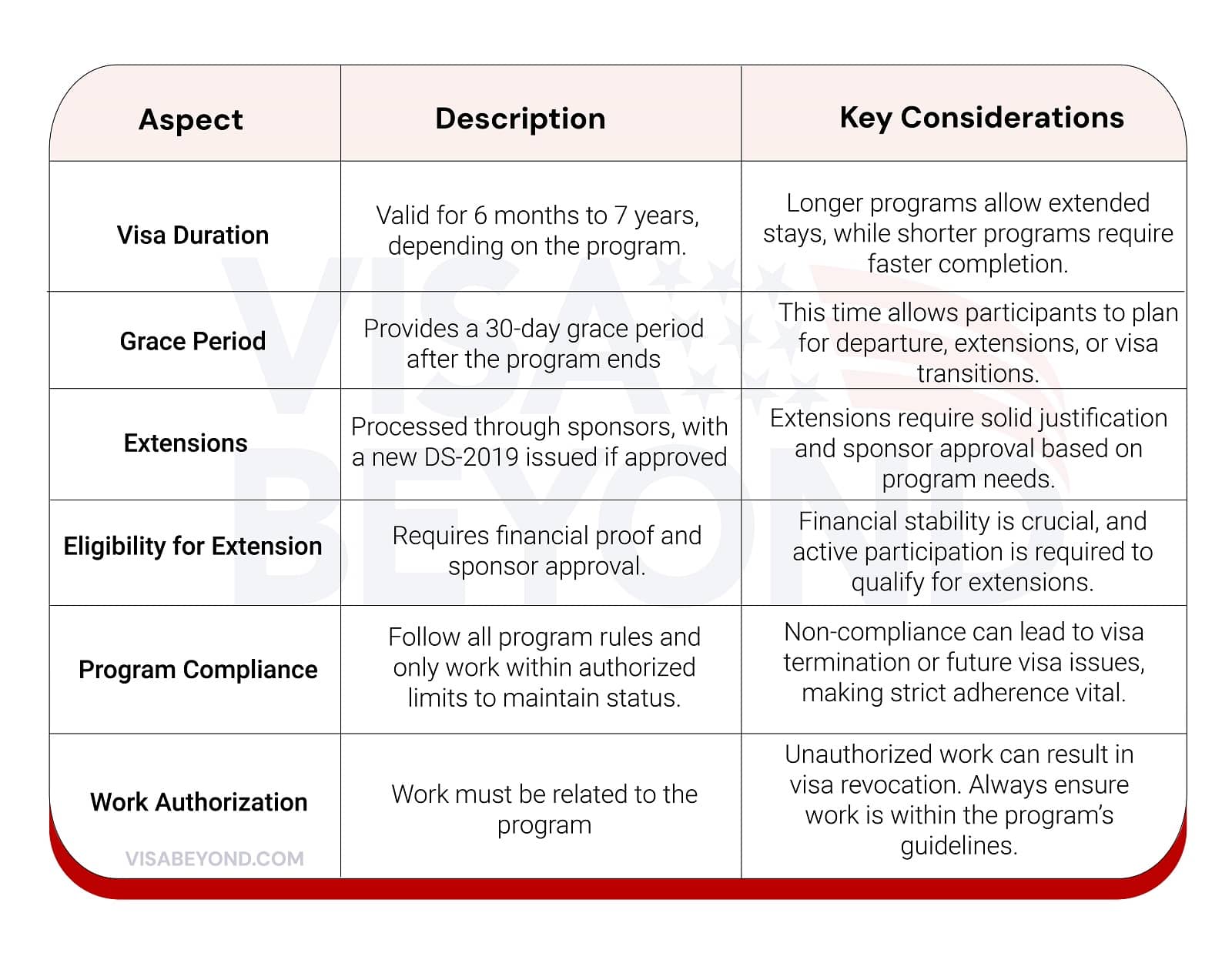
J1 Visa for Dependents
J2 Visa allows spouses and children of J1 Visa holders to join them in the U.S. They can stay for the duration of the J1 Visa holder’s program and may apply for work authorization or attend school.
What is the J2 Visa?
J2 Visa holders can live in the U.S. while the J1 Visa holder participates in their exchange program.
Work Authorization for J2 Visa Holders
J2 visa holders can apply for a work permit (Employment Authorization Document) by filing Form I-765. Once approved, they are eligible to work legally in the U.S. without restrictions on the type or location of employment.
Educational Opportunities for J2 Visa Holders
J2 Visa holders can enroll in U.S. schools or universities without needing additional visas. This gives dependents the flexibility to pursue education while in the U.S.
Transitioning from J1 Visa to Other Visa Types
Many visa holders may wish to stay in the U.S. longer or transition to a work visa like the H1B or apply for a Green Card. This transition is possible but depends on eligibility and sponsor approval.
Can You Transition from J1 Visa to H1B or Green Card?
Yes, transitioning from a J1 Visa to an H1B or Green Card is possible, but it requires employer sponsorship. Additionally, if you are subject to the two-year home residency requirement, you must either fulfill it or obtain a waiver before applying for another visa.
Steps for Transitioning from J1 to a Different Visa
- Find a U.S. employer willing to sponsor your H1B or Green Card.
- Apply for a Change of Status by filing the necessary forms (I-129 for H1B or I-485 for Green Card).
- If subject to the home residency requirement, apply for a waiver.
J1 Visa Challenges and Solutions
Applying for and maintaining a visa can come with challenges, such as visa denials or sponsorship loss. It’s crucial to understand common issues and how to address them to ensure a smooth visa experience.
Let’s Make Your U.S. Dreams a Reality.
Common Reasons for J1 Visa Denials and How to Avoid Them
Common reasons for J1 Visa denials include:
- Insufficient financial proof: Not demonstrating enough funds to support yourself.
- Failure to show ties to your home country: This can lead to concerns about your intent to return.
- Incomplete or incorrect documentation.
To avoid denial, ensure your application is complete and you provide clear evidence of your intent to return home.
What Happens If You Lose Your Job or Sponsorship on a J1 Visa?
If you lose your job or sponsorship, you must notify your sponsor immediately. You may need to transfer to another sponsor or return to your home country. Without a valid sponsor, your Visa may be revoked.
Maximizing Your Experience
To make the most of your Visa program, it’s important to engage fully in your exchange, develop new skills, and expand your professional network in the U.S.
How to Make the Most of Your J1 Visa Program
- Engage in your program: Take full advantage of training, research, or work opportunities.
- Network: Build professional connections through events, seminars, and workshops.
- Seek additional learning: Participate in any additional cultural or educational opportunities.
Networking and Building Professional Connections on a J1 Visa
Networking is crucial during your visa program. Attend industry events, join professional organizations, and connect with colleagues in your field. Building relationships can open doors for future opportunities and help you maximize your U.S. exchange experience.
Latest News.
From the blog

-
- Posted by Alvez

-
- Posted by Alvez
"*" indicates required fields
